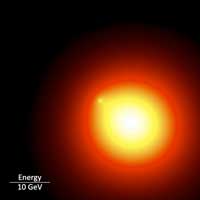 NASA's Fermi Gamma-ray Space Telescope has discovered a faint but sprawling glow of high-energy light around a nearby pulsar. If visible to the human eye, this gamma-ray 'halo' would appear about 40 times bigger in the sky than a full Moon. This structure may provide the solution to a long-standing mystery about the amount of antimatter in our neighborhood.
NASA's Fermi Gamma-ray Space Telescope has discovered a faint but sprawling glow of high-energy light around a nearby pulsar. If visible to the human eye, this gamma-ray 'halo' would appear about 40 times bigger in the sky than a full Moon. This structure may provide the solution to a long-standing mystery about the amount of antimatter in our neighborhood.
Dec 20th, 2019
Read more
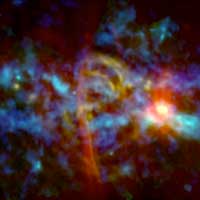 Deep in our Milky Way galaxy's center, a candy cane emerges as the centerpiece of a new, colorful composite image from a NASA camera, just in time for the holidays.
Deep in our Milky Way galaxy's center, a candy cane emerges as the centerpiece of a new, colorful composite image from a NASA camera, just in time for the holidays.
Dec 19th, 2019
Read more
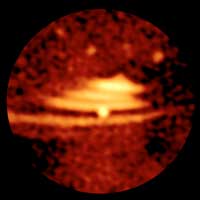 Astronomers have investigated galactic radio objects that adopt shapes such as Christmas trees and harps. They were able to answer the old question of the transport of cosmic rays.
Astronomers have investigated galactic radio objects that adopt shapes such as Christmas trees and harps. They were able to answer the old question of the transport of cosmic rays.
Dec 19th, 2019
Read more
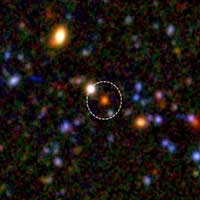 A distant galaxy more massive than our Milky Way -- with more than a trillion stars -- has revealed that the 'cores' of massive galaxies in the Universe had formed already 1.5 billion years after the Big Bang.
A distant galaxy more massive than our Milky Way -- with more than a trillion stars -- has revealed that the 'cores' of massive galaxies in the Universe had formed already 1.5 billion years after the Big Bang.
Dec 19th, 2019
Read more
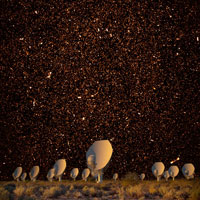 Thousands of galaxies are visible in this radio image of an area in the Southern Sky, made with the MeerKAT telescope. The numerous faint dots are distant galaxies like our own Milky Way, that have never been observed in radio light before.
Thousands of galaxies are visible in this radio image of an area in the Southern Sky, made with the MeerKAT telescope. The numerous faint dots are distant galaxies like our own Milky Way, that have never been observed in radio light before.
Dec 17th, 2019
Read more
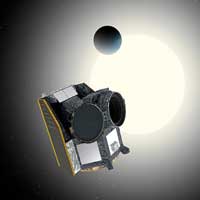 A quarter of a century after the discovery of the first extrasolar planet, the CHEOPS space telescope will finally enable researchers to determine what exoplanets are made of.
A quarter of a century after the discovery of the first extrasolar planet, the CHEOPS space telescope will finally enable researchers to determine what exoplanets are made of.
Dec 16th, 2019
Read more
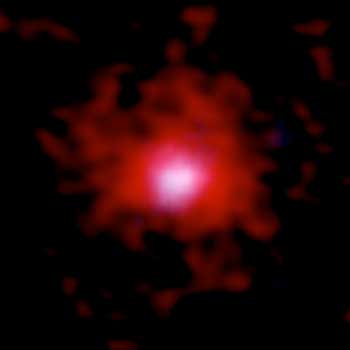 ALMA spots earliest environment pollution in the universe.
ALMA spots earliest environment pollution in the universe.
Dec 16th, 2019
Read more
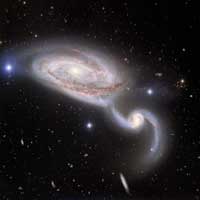 Galaxies lead a graceful existence on cosmic timescales. Over millions of years, they can engage in elaborate dances that produce some of Nature's most exquisite and striking grand designs. Few are as captivating as the galactic duo known as NGC 5394/5, sometimes nicknamed the Heron Galaxy.
Galaxies lead a graceful existence on cosmic timescales. Over millions of years, they can engage in elaborate dances that produce some of Nature's most exquisite and striking grand designs. Few are as captivating as the galactic duo known as NGC 5394/5, sometimes nicknamed the Heron Galaxy.
Dec 13th, 2019
Read more
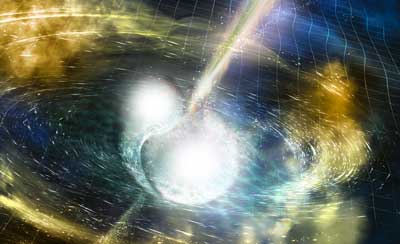 Scientists are getting better at modeling the complex tangle of physics properties at play in one of the most powerful events in the known universe: the merger of two neutron stars.
Scientists are getting better at modeling the complex tangle of physics properties at play in one of the most powerful events in the known universe: the merger of two neutron stars.
Dec 12th, 2019
Read more
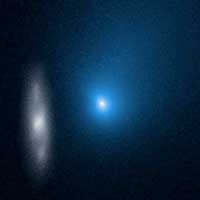 This mysterious visitor from the depths of space is the first identified comet to arrive here from another star. We don't know from where or when the comet started heading toward our Sun, but it won't hang around for long.
This mysterious visitor from the depths of space is the first identified comet to arrive here from another star. We don't know from where or when the comet started heading toward our Sun, but it won't hang around for long.
Dec 12th, 2019
Read more
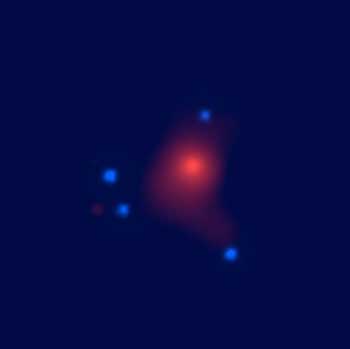 Astronomers are reporting the detection of extragalactic planet-mass objects in a second and third galaxy beyond the Milky Way after the first detection in 2018. With the existing observational resources, it is impossible to directly detect planet-mass objects beyond the Milky Way and to measure its rogue planetary population.
Astronomers are reporting the detection of extragalactic planet-mass objects in a second and third galaxy beyond the Milky Way after the first detection in 2018. With the existing observational resources, it is impossible to directly detect planet-mass objects beyond the Milky Way and to measure its rogue planetary population.
Dec 12th, 2019
Read more
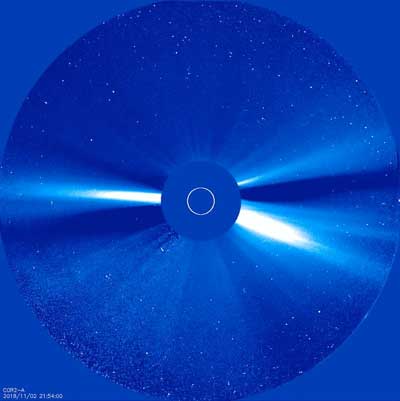 Nearly a year and a half into its mission, Parker Solar Probe has returned gigabytes of data on the Sun and its atmosphere. Following the release of the very first science from the mission, five researchers presented additional new findings from Parker Solar Probe.
Nearly a year and a half into its mission, Parker Solar Probe has returned gigabytes of data on the Sun and its atmosphere. Following the release of the very first science from the mission, five researchers presented additional new findings from Parker Solar Probe.
Dec 12th, 2019
Read more
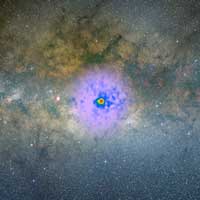 A new analysis puts dark matter back in the game as a possible source of energy excess at the galactic center.
A new analysis puts dark matter back in the game as a possible source of energy excess at the galactic center.
Dec 11th, 2019
Read more
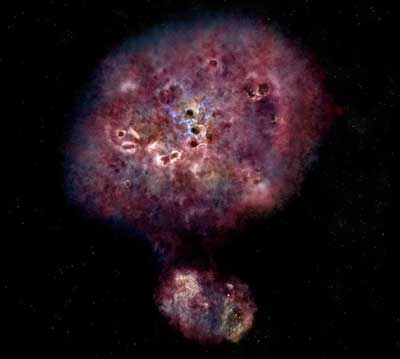 Astronomers have spotted the light of a massive galaxy seen only 970 million years after the Big Bang. This galaxy, called MAMBO-9, is the most distant dusty star-forming galaxy that has ever been observed without the help of a gravitational lens.
Astronomers have spotted the light of a massive galaxy seen only 970 million years after the Big Bang. This galaxy, called MAMBO-9, is the most distant dusty star-forming galaxy that has ever been observed without the help of a gravitational lens.
Dec 11th, 2019
Read more
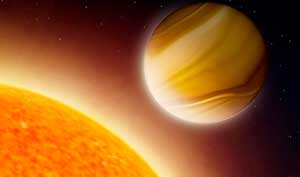 The most extensive survey of atmospheric chemical compositions of exoplanets to date has revealed trends that challenge current theories of planet formation and has implications for the search for water in the solar system and beyond.
The most extensive survey of atmospheric chemical compositions of exoplanets to date has revealed trends that challenge current theories of planet formation and has implications for the search for water in the solar system and beyond.
Dec 11th, 2019
Read more
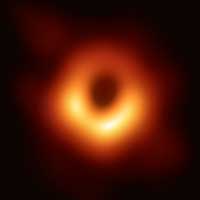 Black holes in the early universe pose a bit of a problem. Based on observations from telescopes on Earth and in space, we know that some black holes grew to be a billion times the mass of the sun just one billion years after the Big Bang. Current models of black hole growth, however, can't explain this speed of growth.
Black holes in the early universe pose a bit of a problem. Based on observations from telescopes on Earth and in space, we know that some black holes grew to be a billion times the mass of the sun just one billion years after the Big Bang. Current models of black hole growth, however, can't explain this speed of growth.
Dec 10th, 2019
Read more
 Scientists discovered a unique neutron star, the magnetic field of which is apparent only when the star is seen under a certain angle relative to the observer.
Scientists discovered a unique neutron star, the magnetic field of which is apparent only when the star is seen under a certain angle relative to the observer.
Dec 9th, 2019
Read more
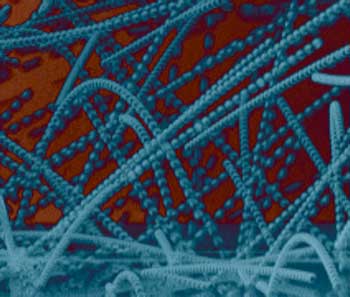 Scientists may have figured out how dust particles can stick together to form planets, according to a study that may also help to improve industrial processes.
Scientists may have figured out how dust particles can stick together to form planets, according to a study that may also help to improve industrial processes.
Dec 9th, 2019
Read more
 NASA's Fermi Gamma-ray Space Telescope has discovered a faint but sprawling glow of high-energy light around a nearby pulsar. If visible to the human eye, this gamma-ray 'halo' would appear about 40 times bigger in the sky than a full Moon. This structure may provide the solution to a long-standing mystery about the amount of antimatter in our neighborhood.
NASA's Fermi Gamma-ray Space Telescope has discovered a faint but sprawling glow of high-energy light around a nearby pulsar. If visible to the human eye, this gamma-ray 'halo' would appear about 40 times bigger in the sky than a full Moon. This structure may provide the solution to a long-standing mystery about the amount of antimatter in our neighborhood. 
 Subscribe to our Space Exploration News feed
Subscribe to our Space Exploration News feed















